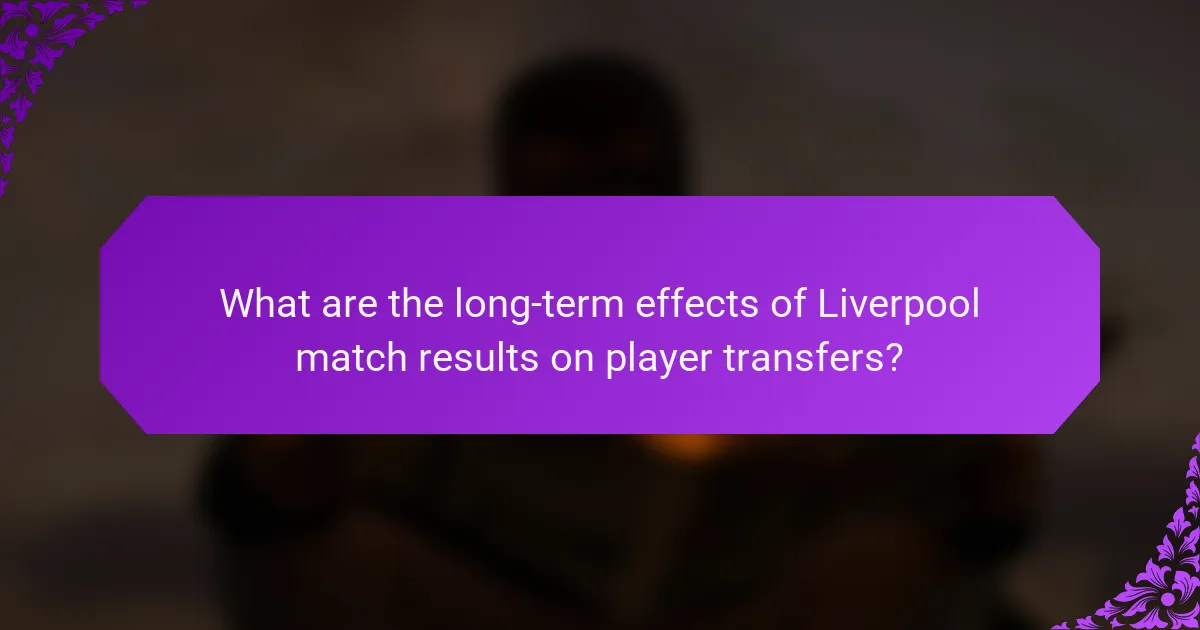Liverpool match results are the outcomes of the club’s football games, significantly impacting their standing in various competitions, including the Premier League and UEFA Champions League. Winning matches can enhance the club’s reputation and attract high-caliber players, while poor results may lead to player departures and affect recruitment strategies. The article examines how these match outcomes influence Liverpool’s scouting and transfer activities, highlighting the correlation between performance metrics and player acquisitions. Historical data demonstrates that successful seasons often result in increased transfer activity, shaping the club’s overall approach to player recruitment.

What are Liverpool match results and their significance?
Liverpool match results refer to the outcomes of the club’s football matches. These results are significant as they impact the team’s standing in competitions. For example, winning matches can lead to higher positions in the Premier League table. This, in turn, influences the club’s ability to qualify for tournaments like the UEFA Champions League. Strong performances can attract potential signings, enhancing the club’s reputation. Conversely, poor results may lead to player departures or reduced interest from prospective transfers. Overall, match outcomes play a crucial role in shaping Liverpool’s transfer strategies and player recruitment.
How do Liverpool match results impact team performance?
Liverpool match results directly influence team performance by affecting player morale and confidence. Positive results boost team spirit and cohesion. Players often perform better when they feel supported by victories. Conversely, negative results can lead to decreased motivation and increased pressure. This dynamic affects individual performances and overall team strategy. For instance, during the 2019-2020 season, Liverpool’s 18 consecutive league wins showcased how success can elevate team performance. In contrast, a series of losses may prompt tactical changes or player transfers to improve outcomes. Thus, match results play a crucial role in shaping Liverpool’s performance trajectory.
What statistics are considered in evaluating Liverpool match results?
Key statistics considered in evaluating Liverpool match results include goals scored, goals conceded, possession percentage, and shots on target. Additional metrics are passing accuracy, player ratings, and distance covered by players. These statistics provide insights into team performance and effectiveness. Historical data shows that Liverpool’s goal difference significantly influences their league standing. Analyzing these metrics aids in assessing player contributions and overall team dynamics.
How do match results influence fan engagement and support?
Match results significantly influence fan engagement and support. Winning matches typically boosts fan morale and increases attendance at future games. Fans often express greater loyalty and enthusiasm when their team performs well. A study by the University of California found that a single victory can increase merchandise sales by 20%. Conversely, losing streaks can lead to decreased attendance and engagement. Fans may feel disheartened, leading to reduced social media interactions and less participation in fan events. Overall, match outcomes directly impact the emotional connection fans have with their team.
What role do Liverpool match results play in player transfers?
Liverpool match results significantly impact player transfers. Successful match outcomes can enhance the club’s reputation and attractiveness to potential signings. For instance, winning major trophies can signal a competitive environment, attracting high-caliber players. Conversely, poor results may lead to a reassessment of squad needs and trigger transfer activity to strengthen the team. Historical data shows that clubs performing well in leagues often see increases in transfer interest and successful signings. Additionally, match performance influences the club’s financial position, affecting transfer budgets and strategies.
How do successful match results affect transfer negotiations?
Successful match results enhance a club’s negotiating power in transfer discussions. Winning matches boosts a team’s reputation and attractiveness to potential players. A successful season can lead to increased financial resources from sponsorships and ticket sales. This financial strength allows clubs to offer more competitive salaries. Additionally, success can create a positive environment, making players more inclined to join. Historical examples show that clubs performing well in leagues often attract top talent. For instance, Liverpool’s recent successes have positioned them favorably in the transfer market. Overall, successful match results directly impact a club’s ability to negotiate effectively in player transfers.
What is the relationship between match performance and player valuation?
Match performance directly influences player valuation. Higher performance metrics typically lead to increased market value. For example, a player scoring multiple goals in key matches can see their valuation rise significantly. Conversely, poor performances can lead to decreased interest from clubs and lower valuations. Statistical analyses often show a correlation between match ratings and transfer fees. Clubs often use performance data to assess player worth in the transfer market. This relationship is evident in historical transfer records, where standout performances have resulted in substantial transfer fees.

How do Liverpool match results influence scouting and recruitment?
Liverpool match results significantly influence their scouting and recruitment strategies. These outcomes provide insights into team performance and areas needing improvement. Scouting focuses on players who can fill gaps exposed during matches. For instance, a string of losses may prompt scouts to identify defenders or midfielders to strengthen the squad.
Moreover, match results can highlight the effectiveness of current players. Consistent underperformance may lead to reevaluation of player contracts or potential transfers. Historical data shows that clubs often adjust their recruitment based on seasonal performance metrics.
In addition, Liverpool’s success in competitions can elevate their profile, attracting higher-caliber talent. Conversely, poor results can deter potential signings. Therefore, match outcomes are crucial in shaping the club’s recruitment approach and overall strategy.
What specific player attributes are affected by match outcomes?
Match outcomes affect various player attributes, including confidence, performance metrics, and market value. A win can boost a player’s confidence, leading to improved individual performances in subsequent matches. Performance metrics such as goals scored, assists, and defensive actions are directly influenced by match results. For instance, a player who consistently performs well in winning matches may see an increase in their market value. Conversely, poor match outcomes can diminish a player’s confidence and negatively impact their statistics. Historical data indicates that players from winning teams often attract more interest from potential clubs. This correlation between match results and player attributes is critical in shaping transfer decisions.
How do scouts assess players based on Liverpool match results?
Scouts assess players based on Liverpool match results by analyzing individual performance metrics. They focus on statistics such as goals, assists, and defensive contributions. Scouts also evaluate a player’s decision-making and tactical awareness during matches. Liverpool’s match results provide context for a player’s performance against high-level competition. Performance consistency in these matches is crucial for assessment. Additionally, scouts consider how players respond under pressure. They look for attributes like resilience and adaptability in challenging situations. Overall, match results serve as a benchmark for potential transfers and player development.
What patterns emerge in player transfers following key match results?
Player transfers often reflect key match results. Following significant wins, teams may seek to enhance their squad. Conversely, losses can trigger player sales or acquisitions. For instance, a defeat in a crucial match may lead clubs to reassess their roster. Historical data shows that clubs frequently target players from opposing teams after a loss. This pattern suggests a strategy to strengthen weaknesses exposed during matches. Additionally, successful performances can lead to increased interest in star players. Clubs may receive transfer offers after standout displays in key games. Such dynamics illustrate the direct link between match outcomes and transfer market activity.
How do match results shape the club’s transfer strategy?
Match results significantly influence a club’s transfer strategy. Winning matches can indicate the effectiveness of the current squad. If a team consistently wins, management may prioritize retaining players rather than making major changes. Conversely, poor match results often lead to a reassessment of player performance. Clubs may identify weaknesses in specific positions that need strengthening. For example, if Liverpool struggles defensively, they might seek a new center-back. Historical data shows that clubs frequently adjust their transfer targets based on seasonal performance. Transfer strategies are often reactive to immediate needs highlighted by match outcomes. Thus, match results play a crucial role in shaping a club’s approach to player acquisitions.
What factors lead to changes in transfer strategy based on results?
Changes in transfer strategy based on results are influenced by performance metrics, player injuries, and financial considerations. Performance metrics include win-loss records, player statistics, and team rankings. Poor results may prompt the club to seek reinforcements or offload underperforming players. Player injuries can create gaps in the squad, necessitating immediate transfers to maintain competitiveness. Financial considerations involve budget constraints and potential revenue impacts from poor performance. For instance, a failure to qualify for European competitions can reduce available funds for transfers. Collectively, these factors drive clubs like Liverpool to adapt their transfer strategies in response to match outcomes.
How do Liverpool’s match results compare to rival clubs in transfer decisions?
Liverpool’s match results significantly influence their transfer decisions compared to rival clubs. Successful match outcomes often lead to increased confidence in player acquisitions. For instance, a strong season performance can attract top talent seeking a competitive environment.
In contrast, rival clubs may prioritize different factors such as financial power or historical prestige. For example, Manchester City invests heavily regardless of immediate match results.
Statistically, Liverpool’s recent success in the Premier League and Champions League has bolstered their transfer appeal. This trend shows that clubs performing well on the pitch are more likely to secure high-profile signings.
Additionally, Liverpool’s recruitment strategy focuses on players who fit their playing style, which is often validated by match performance. Thus, match results play a pivotal role in shaping transfer strategies across clubs, with Liverpool leveraging their achievements to enhance their squad.

What are the long-term effects of Liverpool match results on player transfers?
Liverpool match results significantly influence player transfers over the long term. Consistent winning can enhance the club’s reputation. A strong performance in competitions attracts high-caliber players. Conversely, poor results may lead to player departures seeking better opportunities. Historical data shows that Liverpool’s success in the Premier League and Champions League correlates with increased transfer activity. For instance, after winning the Champions League in 2019, Liverpool secured key signings like Thiago Alcântara. Additionally, match results can impact player valuations in the transfer market. A winning streak often leads to inflated prices for players. Overall, Liverpool’s match outcomes play a crucial role in shaping its transfer strategy and player acquisitions.
How do historical match results influence future transfer policies?
Historical match results significantly influence future transfer policies by providing data on team performance and player effectiveness. Analyzing past matches helps clubs identify strengths and weaknesses. For example, if a team consistently struggles against strong opponents, they may seek to acquire players who excel in those situations. Historical data also reveals which positions need reinforcement based on match outcomes. If a club frequently loses due to a lack of scoring, they may prioritize signing strikers. Furthermore, previous transfer successes or failures inform future decisions. Clubs often look at how past signings performed in relation to match results. For instance, if a player’s arrival correlates with improved performance, similar profiles may be targeted in future transfers. Thus, historical match results serve as a crucial reference point for shaping strategic transfer policies.
What lessons can be learned from past transfer decisions linked to match outcomes?
Past transfer decisions linked to match outcomes reveal critical lessons for clubs. One lesson is the importance of aligning player acquisitions with team needs. For instance, Liverpool’s signing of Virgil van Dijk in January 2018 followed a defensive frailty exposed in previous matches. This transfer directly contributed to improved match outcomes, showcasing the value of strategic investments.
Additionally, analyzing the impact of transfers on team performance is vital. When Liverpool acquired Alisson Becker, their clean sheet rate significantly increased. This correlation indicates that targeted signings can enhance overall match results.
Moreover, past mistakes highlight the risks of impulsive transfers. The failure to secure key players in critical positions can lead to poor performances. For example, missing out on a forward during a goal drought can exacerbate match losses.
In summary, clubs can learn that informed transfer decisions based on match outcomes can lead to improved performance. Prioritizing team needs and analyzing past results are essential strategies for success.
What practical strategies can Liverpool implement for future transfers?
Liverpool can implement data-driven scouting to enhance future transfers. Utilizing analytics can identify undervalued players with high potential. This method has been effective in the recruitment of players like Diogo Jota. Liverpool should also strengthen relationships with clubs for loan agreements. This strategy allows them to assess talent in a competitive environment. Additionally, focusing on youth development can yield long-term benefits. Investing in the academy has produced players like Trent Alexander-Arnold. Finally, maintaining a flexible wage structure can attract top talent while managing financial sustainability. This approach aligns with the club’s financial model and competitive aspirations.
How can analysis of match results improve recruitment processes?
Analysis of match results can significantly enhance recruitment processes by providing data-driven insights into player performance. By evaluating match statistics, recruiters can identify players who consistently excel in specific roles. This analysis helps in understanding a player’s strengths and weaknesses in real-game scenarios. For instance, metrics such as goals scored, assists, and defensive actions provide quantifiable evidence of a player’s impact on the field. Additionally, match results can reveal how well a player fits into a team’s tactical framework. Successful recruitment is often based on identifying players who not only perform well individually but also complement existing team dynamics. Therefore, leveraging match result analysis leads to more informed and strategic recruitment decisions.
What best practices should Liverpool follow in light of match outcomes?
Liverpool should analyze match outcomes to inform player transfer decisions. They need to evaluate performance metrics from each game. This includes assessing player contributions, team dynamics, and tactical effectiveness. Historical data shows that clubs that analyze match data make more informed transfer choices. For instance, clubs like Manchester City have successfully used data analytics to enhance their squad. Liverpool should also consider player market value fluctuations post-match. This can help them identify potential transfer targets or offload underperforming players. Regular assessments of match outcomes can guide strategic recruitment and retention.
Liverpool match results are crucial in shaping the club’s player transfer strategies, influencing team performance, player morale, and fan engagement. The outcomes of matches impact the club’s standing in competitions, affecting recruitment decisions and the valuation of players. Key statistics such as goals scored, possession percentage, and player contributions are analyzed to inform transfer policies. Additionally, historical match results provide insights into areas needing improvement and help identify potential signings. Overall, the relationship between match results and player transfers is significant, guiding Liverpool’s approach to enhancing their squad.
